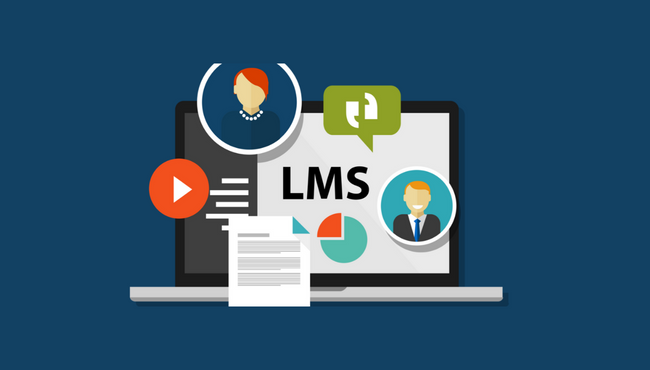
Learning is a vital part of any business’s operation. The opportunities to gain knowledge come from new processes, operations, products, services, and every situation you may encounter at work.
Learning management systems (LMS) are fast becoming an integral part of businesses of all types and sizes.
An effective LMS is especially crucial in today’s world, where we are constantly exposed to new ideas from other people, places, and the internet.
Here in this article, we will discuss what exactly is LMS, Why businesses need an LMS and challenges in Learning Management Systems.
What is an LMS?
So, What is an LMS? – A learning management system, or LMS for short, is a software that allows organizations to manage online courses, facilitate online meetings, and set up virtual learning environments (VLIs).
According to Gartner, an LMS is not a simple online platform for managing online courses but rather a technology that handles any process that can be digitized and automated, whether it’s learning, sales, or customer service.
An LMS is often used to manage learning activities across an organization, but it can also be used to administer entire departments and business processes in the whole company.
For example, an LMS can be used for an organization’s automation and sales process management.
Why Businesses Need an LMS
An LMS guarantees effective skill improvement, gaining new competencies and knowledge quicker. A learning management system is an online platform that allows businesses to manage their employees’ learning activities, such as creating training programs, setting up online classrooms, conducting courses, and monitoring the completion of all learning activities.
Many companies use learning management systems to help employees stay up-to-date with new and changing technologies, operations, and required skills. This way, employees can not only complete their tasks better but also learn new and diverse skills that can come in handy in their jobs.
An effective learning management system is often necessary to successfully operate your business and remain competitive in a rapidly changing market.
With the suitable LMS in place, your organization can provide employees with the training they need to succeed in their roles while saving time and resources.
Key Benefits of Learning with an LMS
We have listed just a few of the many LMS usage advantages. It’s no wonder that more and more businesses are choosing to implement the system to help their employees stay up-to-date and learn new skills more effectively. So here are the top benefits of using LMS.
- It automates and manages all aspects of learning
- There’s no need to hire more employees
- You will notice an improved employee engagement
- Reduction of training costs
- Improved employee satisfaction
- Enhanced retention rates
- Employee productivity growth
Now, let’s take a closer look at what these benefits mean for your organization.
Which Learning Platform is Right for you?
When it comes to choosing an LMS, the first thing you’ll want to do is determine which type of learning platform is right for your company. There are two main types of LMS: hosted and self-hosted.
Hosted Learning Platforms is essentially an online portal that you access through a browser. This type of LMS is excellent for businesses that don’t have a lot of technical expertise since it’s accessible through a web browser.
Self-Hosted Learning Platforms means that the software is installed on your servers. This type of LMS is best for businesses that want total control over their technology and are unwilling to rely on a third-party service.
One of the benefits of self-hosted LMSs is that compatibility issues appear less frequently, so you can be sure your software will work with the latest versions of its devices. Another significant advantage of self-hosted LMS is that you have complete control over security and privacy.
Business Priorities to Consider when Selecting an LMS
When choosing an LMS, your first step is to look closely at the list of essential features for your business and answer a few questions. What key functionalities will your organization require? Which features are the top priority for your business?
Which pricing plan is most suitable for your company? How do you plan to support your LMS? What’s the timeline for implementation? What are the best external tools that can integrate with your LMS?
Finally, what’s the best way to measure the success of your LMS implementation? Having all the above matters well thought out, you are ready to make a solid decision.
Top 5 Challenges in Learning Management System

Here we have listed the top 5 challenges in the Learning Management System (LMS) that everyone should understand.
1. Suffocating with Immense Content
It might be enticing to include all the knowledge you know in the training module. When a team is involved in course creation, this happens quite normally.
However, it overwhelms the learners in the first place. It is called “cognitive overload”. Also, learners are unlikely to complete lengthy content.
For example, if you dump all the information in your LMS as an 8-hour video, it is sure that no one watches till the end; rather you can cut them into modules.
Chunking them into small segments and presenting them in a step by step manner would look achievable for the learners.
2. Learn at their Own Pace
Asynchronous learning is the one thing most learners prefer to access. Basically, every learner has their own pace to understand and catch up on the course.
If you are pushing them to follow a tight deadline, chances are that they might not even grasp the concept completely.
Many successful online platforms set a window of at least a month to 60 days for users to learn at their own pace depending on their course. This way, it doesn’t either affect the learner or the pricing model of the course creator.
3. Personalized Support and Guidance
Your work doesn’t end with creating content and posting them on the website. As a course creator, you must employ subject matter experts to clarify the doubts of the learners.
Many online course creators don’t include this feature in their courses; thus, students feel like they are left out. Personalized support options such as email, live chats, and discussion forums minimize the ambiguity, making the learners interact and get guidance.
Even placing short quizzes and quick assignments can help you determine whether the learners understood the concept or not.
4. No Specificity
It is more important how you present the content than what content you present. Many eLearning content providers fail to touch this pain point from the learner’s perspective. Thus, they disappoint to create an impact on their learners.
For example, a boring or tough topic might not spark your learners’ interest unless you include it engagingly.
Infographics, animation, real-life scenario correlation, and interactive polls are some of the LMS WordPress features that fascinate your learners. Plus, these mediums simplify the dry and dull subject matter.
5. Insufficient Marketing
No matter how great your course is, people get to know only when you exhibit your existence. Marketing is the key to showcase any online business.
Likewise, you need to present to your target audience what is in the course and how it will strike a difference in their career. Pushing these benefits in the upfront will attract possible learners towards your course.
Also, it requires a specific digital marketing strategy to advertise your eLearning business. If you’re developing content for employee training, then you need to focus justifying the profits on their professional developments.
What To Consider When Estimating LMS Budget

The key to LMS’s success is creating an accurate budget. It enables you to make the best use of your resources and deliver personalized online training materials without breaking the bank.
Here are a few things to include on your LMS expense sheet to create a reasonable budget.
1. LMS Training
Even the most user-friendly tools necessitate some training. This is especially true if your learning and development team is new to the LMS platform and has never used one to implement and track online training before.
Some LMS providers offer free online training through instructional videos and other online resources, whereas others provide one-on-one assistance from an IT specialist who instructs you through all of the key features.
It’s critical to inquire about the learning curve ahead of time, as well as which support services the LMS vendor incorporates into the package.
2. Installation And Initial Expenses
If you buy your LMS explicitly, you should expect to pay the licensing costs upfront. Even if you choose a monthly or yearly subscription, you must still consider all of the preparation costs.
Evaluate your current online training materials to prepare them for transformation and the time it takes to analyze the available options and identify the optimal LMS that aligns with your objectives.
For instance, the LMS vendor may provide a free trial and demo, but you will be required to still spend payroll hours evaluating each LMS platform to test out the features and relevance.
3. Licensing Fees On A Monthly Or Annual Basis
Some LMS platforms charge a license renewal fee on a monthly or annual basis. If you do not renew your license, you may be refused access to the LMS platform and lose certain privileges.
LMS vendors may even provide various subscription packages. For example, one’s certain package may be designed for a specific number of users and includes only the most basic features.
This is the best option for smaller organizations that want to evaluate the LMS before committing to a long-term contract with more advanced features.
4. Fee Per User And Learner
The pay-per-user and learner fee is another LMS pricing strategy to consider. This option allows customers to pay only for active users, making it a more cost-effective option for organizations incorporating online training on a limited scale.
Keep in mind that some LMS providers have a minimum user requirement. For example, there are a few vendors that require you to have at least 40 to 50 active users.
Another option is to charge per course and module. In this case, you are charged based on the number of online training materials you upload to the LMS.
5. Consistent eLearning Authoring Tools
You may already have eLearning authoring technology in your organization. They may, however, be incompatible with your new LMS. In that case, you’ll need to buy new software to develop effective online training resources that can be saved in the LMS.
Alternatively, you may wish to purchase additional quick eLearning authoring tools that help speed up the development of online training. All of these expenses should be included in your LMS budget.
6. Payroll For The Learning And Development Team
Without the all-essential human factor, no LMS budget is complete. You must add up all of the payroll hours spent on the LMS process, from choosing the best tool to implementing and tracking the online training content.
The LMS is only as good as the people who use it. Those individuals will require time to master the tool before applying all of their skills and talents to putting your online training strategy into practice with the assistance of the LMS.
It’s a good idea to overvalue the number of payroll hours required for each task. The remaining funds can then be used for other factors of your online training development, such as gathering eLearning reviews from your corporate learners to improve the benefits of your online training course.
7. Upgrades And Additional Features
If you choose a more basic and simple LMS package, you may need to consider the cost of upgrades and extra features, especially if your online training is expected to scale and you need a stronger, more reliable, and more flexible LMS.
An example of such a situation could be your need for more advanced support services and reporting abilities to receive customizable LMS reports that focus on particular areas of problem in online training.
8. Ongoing Maintenance
Learning management systems necessitate ongoing maintenance. To stay on the cutting edge, you must keep updating your online training content and integrate new multimedia.
Moreover, the LMS may necessitate software updates on a timely basis. This ongoing maintenance demands payroll hours and, in some cases, unanticipated fees.
As a result, it’s always a good idea to budget for LMS maintenance in your online training budget.
9. Remember To Include Indirect Costs
When developing your budget, you must also account for a total count of indirect costs. These indirect costs usually involve employee absence and the impact on the organization.
Accounting for employee absences adds up fast if you calculate the organization’s average hours of formal learning for every employee per year.
This also applies to any position that may require to be filled in temporarily while your employees are in training. Such costs should be factored into your budget.
Conclusion:
Despite all its perks, eLearning can give rise to new challenges. However, if you identify them in their roots and plan, you can create an impactful course for your audience.
Besides, make sure to get constant feedback from the participants to erase the loopholes through tweaking.
Creating a realistic and accurate LMS budget allows you to better allocate your resources and select the LMS platform that meets your specific requirements.
Also Read:
